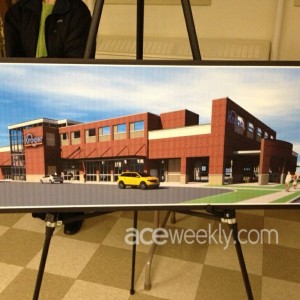
After lengthy discussion this afternoon, Lexington Fayette Urban County Planning Commission approved a zone change for Kroger on Euclid to B-6P (planned shopping center). In recommending the approval, the zoning committee stated that the zone will be in agreement with Lexington’s 2007 Comprehensive Plan. Requested variances, notably increasing the ground area building coverage from 35 percent to 50 percent, were also approved.
Architect Graham Pohl presented his position to the commission as “neutral,” but stated that he had provided feedback from early on in the project, including hosting four meetings in his office (a few doors down from Kroger on Euclid), and had found Kroger representatives to be “solicitious of any information they could get,” and that they had educated themselves extensively to understand “the tone of the neighborhood.” He said the proposed design — including rooftop parking and the new edge, “pulling the building up toward Euclid” represent huge improvements over the current “cheesy…poor design.” Though he acknowledged that he was sensitive to the “disagreements” articulated by some residents who live in close proximity to the current store.
Amy Clark addressed the commission, asking if the proposed design “is a big box, or a shopping center,” and noted that some members of the neighborhood have begun calling the new store Fort Kroger, because of the expanded footprint of the store and the “impenetrable” long wall that is proposed on the Marquis side of the store. Another Marquis homeowner told the commission, “we made a conscious decision not to live in a development such as Beaumont or Hamburg. We live in a vibrant, urban neighborhood,” and said that the new store is not friendly to cycling and walking, also opposing the “impenetrable wall on Marquis.” Columbia Heights resident Ted Cowen characterized the proposed store “a square peg in a round hole.”
Others reminded the commission that while the Kroger is sited in an urban neighborhood, it is not downtown, and that setbacks should appropriately reflect that. Several characterized it as “overbuilt” for the neighborhood, and aired concerns about rumors that Kroger might be planning to shut down the Romany location. (Attorney Bruce Simpson, speaking on Kroger’s behalf, said that Kroger is not considering the closure of any Lexington stores. One commissioner expressed concerns about the “abandoned Kroger shell” in Beaumont.)
From the commission, Lynn Roche-Phillips expressed concern that the new footprint constituted “eight pounds of flour in a five-pound sack.” But Carla Blanton, also from the commission, voiced support for the project, saying “we talk about infill, but we can’t seem to get to the execution of it.” She suggested it isn’t the role of the commission or of government to micromanage how Kroger can do business.
Simpson said the urban market plan is consistent with Lexington’s expressed infill goals to “grow up, not out,” adding, that while no project is perfect, this one represents a major $19 million investment on the part of Kroger into the neighborhood (with “no TIF and no incentives”) and that “if we don’t approve thorny projects,” the alternative would be to expand the urban service area.





